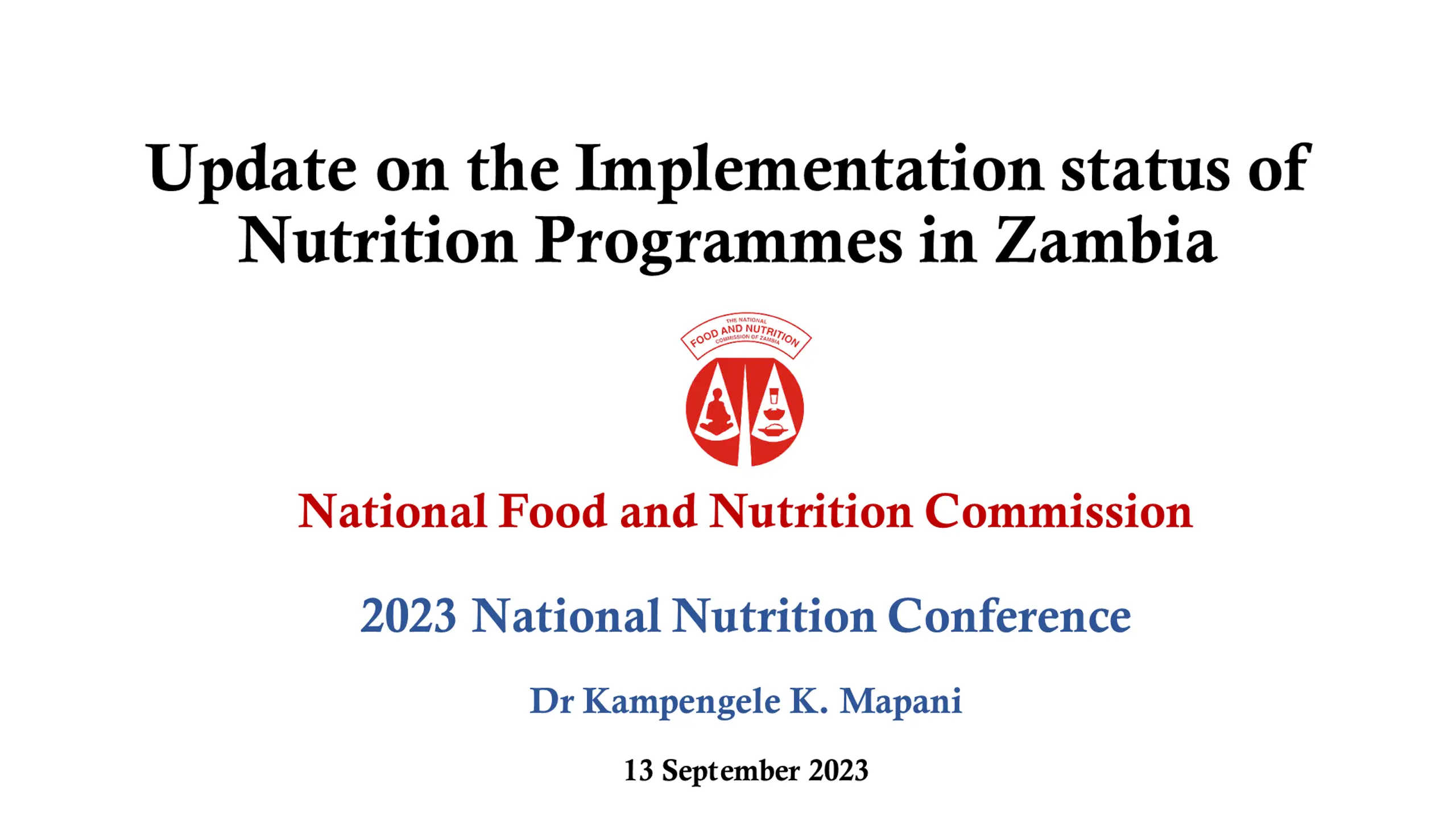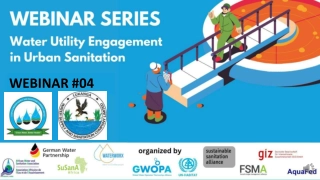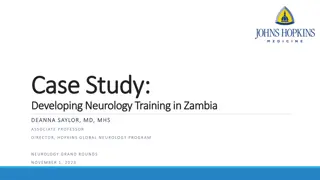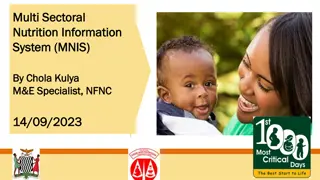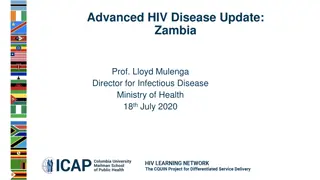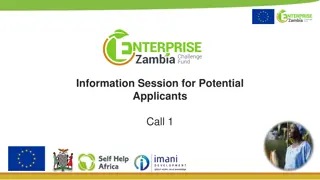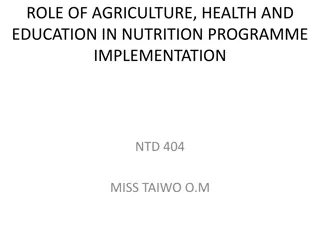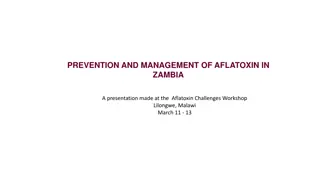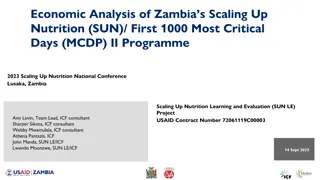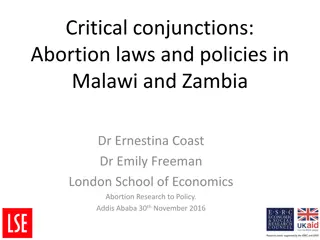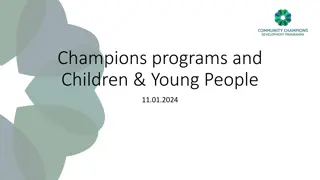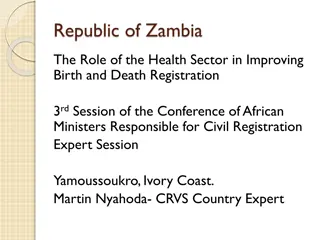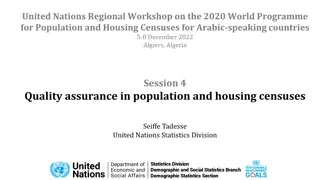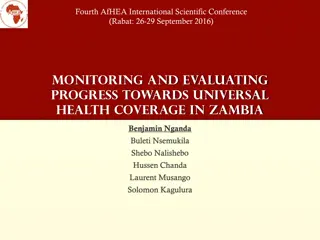Update on Nutrition Programmes Implementation in Zambia
Get the latest updates on the implementation status of nutrition programmes in Zambia at the 2023 National Nutrition Conference. Dr. Kampengele K. Mapani will discuss achievements, challenges, and the way forward.
Download Presentation

Please find below an Image/Link to download the presentation.
The content on the website is provided AS IS for your information and personal use only. It may not be sold, licensed, or shared on other websites without obtaining consent from the author.If you encounter any issues during the download, it is possible that the publisher has removed the file from their server.
You are allowed to download the files provided on this website for personal or commercial use, subject to the condition that they are used lawfully. All files are the property of their respective owners.
The content on the website is provided AS IS for your information and personal use only. It may not be sold, licensed, or shared on other websites without obtaining consent from the author.
E N D
Presentation Transcript
Update on the Implementation status of Nutrition Programmes in Zambia National Food and Nutrition Commission 2023 National Nutrition Conference Dr Kampengele K. Mapani 13 September 2023
Presentation outline INTRODUCTION NUTRITION PROGRAMMES OVERVIEW ACHIEVEMENTS AND CHALLENGES WAY FORWARD
Introduction The malnutrition burden in Zambia is huge, with stunting levels at 35% (ZDHS, 2018) It is a major public health concern Stunting depicts chronic deprivation of adequate nutrition Irreversible - Poor social Economic status Triple burden: Undernutrition (Wasting, stunting), Micronutrient deficiency ( Anemia, Blindness) Overnutrition ( Obesity, Overweight, DR NCDs Hypertension, DM 2)
The Food and Nutrition Act No. 3 of 2020 Implementation of the Act
Functions of the Food and Nutrition Commission Formulate the National Food and Nutrition Programme Coordinate, monitor and evaluate food and nutrition programmes in order to improve delivery and access to food and nutrition services Carry out research and surveillance on food and nutrition matters Promote provision of adequate diets in public and private institutions
Programmes implementing nutrition interventions SUN II / MCDP II - Flagship Programme in Zambia Multisectoral approach Mainly addressing stunting Targeting the 1st1000 days pregnant women, lactating women, adolescents, children 0 to 23 months Nutrition specific and nutrition sensitive interventions Currently in 36 districts Government is implementing with support from cooperating partners
SUN II / MCDP II Needs scale up to all districts and saturate the whole district Sustainability of the subnational level ??? Funding for activities
Baseline survey- biomedical, anthropometric and cognitive assessments Micronutrients supplements (Iron tablets and Vit. A) and de-worming pills (Albendazole) once per year Training teachers in Drug Administration and Life skills Strengthening linkages between Health centres and schools Providing small grants to schools and communities to support SHN and HIV/AIDS interventions Community mobilisation to support SHN activities as a cross cutting activity School Health Nutrition
School Health and Nutrition 70 districts / 116 districts implementing Fully funded by GRZ since July, 2019 Implemented in early childhood and primary schools All government primary and community schools registered with the DEBS Main food is maize meal, pulses and vegetables Production units in every school mandatory
Micronutrient deficiency control Promotion of biofortified (orange) sweet potato Promotion of biofortified (Orange) maize Promotion of biofortified beans (mbereshi beans) Iron/ folate supplementation Deworming programme Presumptive treatment of malaria Coordination of fortification of foods; sugar; salt;
Food systems approach Zambia has developed a transformative food systems that has 5 pathways: 1. Ensuring access to safe and nutritious foods for all 2. Shifting to healthy and sustainable consumption patterns 3. Boosting nature positive food production 4. Advancing equitable livelihoods of people involved in the food systems 5. Building resilience to vulnerabilities, shocks and stresses
Development and sustaining human resource capacity in the nutrition sector Development of food and nutrition related training in public and private training institutions at: Levy Mwanawasa Medical University; University of Zambia; Mukuba University; Mulungushi university; St Eugene DMI University; Livingstone International University of Tourism Excellence and Business Management etc.
Other programmes Multisectoral Nutrition Information System under pilot NiPN Adolescent nutrition Nutrition Friendly Schools Initiative
Way forward All ministries and GRZ agencies to mainstream Nutrition interventions Scale up nutrition interventions to all the districts Development of a National Food and Nutrition Programme Disseminate the Food Consumption and Micronutrient Status Survey Findings - will inform how we proceed with malnutrition control Advocacy towards ring fencing some funds from CDF for nutrition interventions across the country Development of an investment case for more funding towards nutrition activities
Conclusion The nutrition situation in Zambia requires urgent attention if Zambia is to be on track to attain its vision 2030 of becoming a prosperous middle income nation by creating an enabling environment for sustainable socio-economic development It is critical that stakeholders in nutrition continue to work together as an alliance to address all forms of malnutrition It is expected that with the services government is implementing with support from cooperating partners, nutrition goals and targets will be achieved.
Nutrition cooperating partners supporting government
